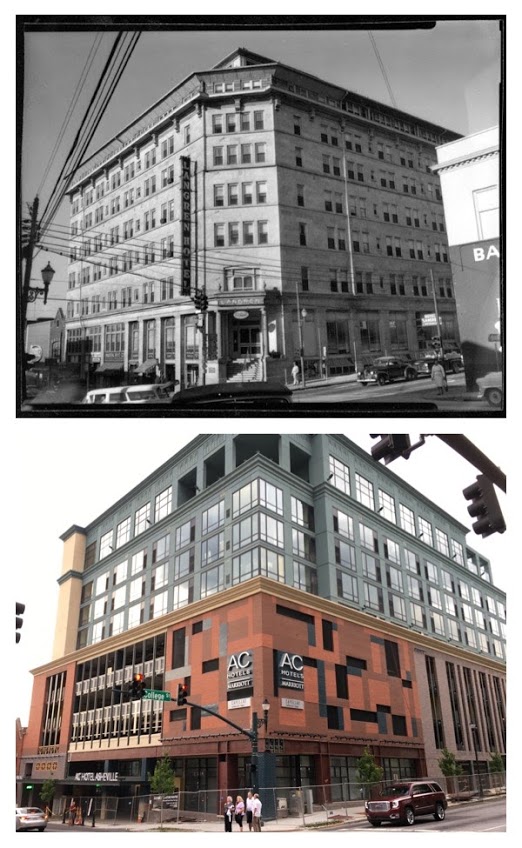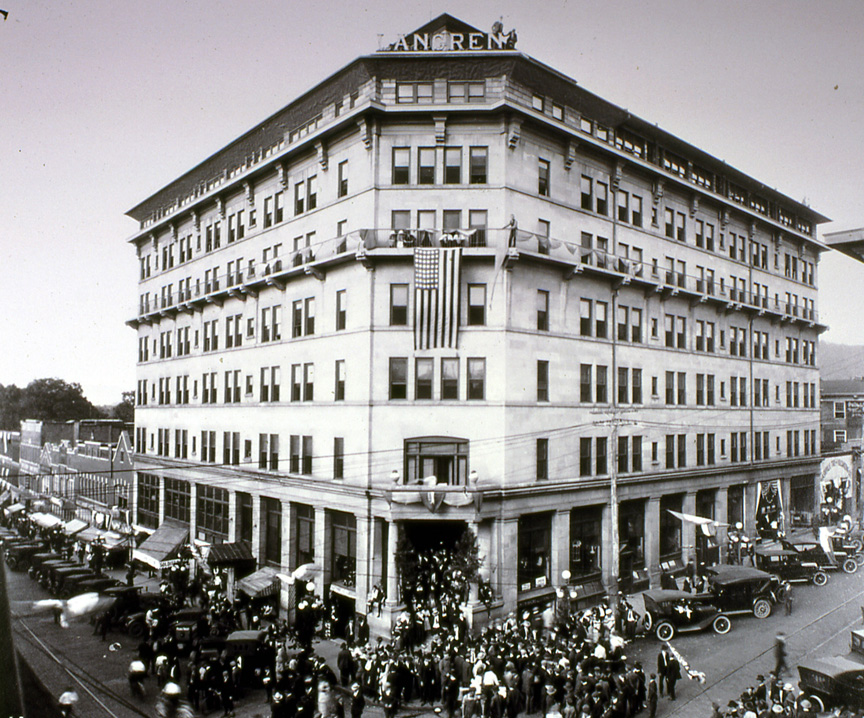Excitement lined the pages of the June 15, 1912, issue of The Asheville Gazette News. With less than three weeks to go before the July 4 opening of the Langren Hotel, Asheville was preparing for its celebration — as well as its promotion. According to the Gazette News, part of the city’s advertising involved the newspaper itself:
“The Asheville board of trade has decided to send out over the south about 5000 numbers of The Gazette-News to be published on July 4 to be known as the Langren number. This edition of the paper will appear in celebration of the formal opening of the new hotel on that date and will be a special Asheville booster edition. The fact that it is to be so widely distributed by the board of trade will give the city some of the best advertising throughout the south that it has had for some time. …
“In addition to this there will be a large volume of reading matter telling what this city has to offer the summer tourists in the way of amusements and comforts, sanitation, unexcelled water and an atmosphere that cannot be equalled anywhere in the whole country. The edition will boost Asheville and it will do it most effectively.”
The Langren was located at the current site of the AC Hotel Asheville Downtown, on the corner of Broadway and College Street. (In 1964, BB&T razed the building to make way for its parking garage.) According to historian Lou Harshaw, it was the city’s first building framed by steel.
Originally set to be named The North State, the hotel’s new and final name was reported in The Asheville Citizen on March 9, 1912. The paper informed readers that Langren was a combination of the names John Lange and Gay Green, the two men “who purchased the concrete frame some time ago and within the past few months changed its appearance from that of an eyesore to a mammoth hostelry, which, when completed, will be among the very best in the south.”

On July 4, a banquet was held inside the hotel to celebrate its opening. That same day, The Asheville Gazette News was distributed throughout the South, promoting the new business. The article began with a box highlighting the hostelry’s features and amenities. This included mention of its steel and concrete construction; 210 rooms, capable of accommodating 500 guests; and “twenty cars of ‘Pyro’ bars, gypsum and asbestos (fireproof) for partitions.”
The article went on to declare that the Langren’s opening was “the most important achievement in the way of provision for the tourist business, in western North Carolina in a decade.” Other points of pride included the the hotel’s roof garden, its Patterson system hot water supply, its public dining room (which was divided into “European style and American style compartments”), and the kitchen (equipped with the “the newest approved appliances and inventions, down to or up to a machine which boils your breakfast eggs just as you order them, so many minutes, neither more nor less”).
On top of these features, the article stressed that the Langren Hotel was fireproof. “The owners do not carry a cent of insurance,” the paper stated. “Fire escapes are provided as a matter of compliance with law. They will never be used for their proper function.”
But above all, the article wanted to make sure its 5,000 out-of-town readers knew the desirablilty of the city as a whole:
“The city of Asheville had come to feel the need of more great hotels. For about ten years now, or since the great money crop of America, cotton, achieved the complete financial restoration of the south, and dating from the time of the last yellow fever scourge, the number of people flocking to the great play-ground, western North Carolina, has been gradually increasing. The houses of entertainment, of various styles and capacities, have been constantly overtaxed in the busiest of the season. Of great hotels, especially, it was found that Asheville actually needed more than she had, in addition to which it was realized that an increase in the number of really high class houses, such as would attract that class of visitors who are in position to command the best of creature comforts, would naturally be a strong factor in the further increase of the sum total of the business.”
Editor’s note: Peculiarities of spelling and punctuation are preserved from the original documents.



Before you comment
The comments section is here to provide a platform for civil dialogue on the issues we face together as a local community. Xpress is committed to offering this platform for all voices, but when the tone of the discussion gets nasty or strays off topic, we believe many people choose not to participate. Xpress editors are determined to moderate comments to ensure a constructive interchange is maintained. All comments judged not to be in keeping with the spirit of civil discourse will be removed and repeat violators will be banned. See here for our terms of service. Thank you for being part of this effort to promote respectful discussion.